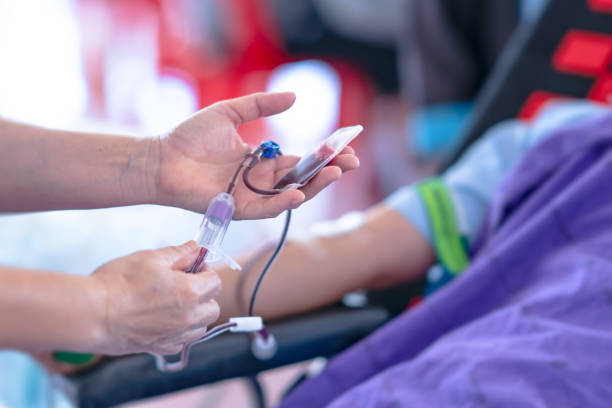Understanding Plasma Donation Requirements
Plasma donation is a crucial process that helps save lives by providing essential components used in various medical treatments. If you're considering donating plasma, it's essential to understand the requirements to ensure a smooth and successful donation experience.
What is Plasma?
Plasma is the liquid portion of your blood, constituting about 55% of its overall content. It is primarily composed of water, proteins, electrolytes, hormones, and waste products. Plasma plays a vital role in maintaining blood pressure, supplying critical proteins for blood clotting and immunity, and carrying electrolytes to muscles. Its unique properties make it indispensable in treating various medical conditions, including burns, trauma, shock, and certain clotting disorders.
Why Donate Plasma?
Donating plasma is a generous act that significantly impacts the lives of patients in need. Plasma-derived therapies are used to treat individuals with rare chronic conditions such as hemophilia and primary immunodeficiency diseases. By donating plasma, you contribute to the production of life-saving treatments and support medical research and development.
Eligibility Criteria for Plasma Donation
To ensure the safety of both the donor and the recipient, there are stringent eligibility criteria that must be met before donating plasma. These requirements may vary slightly depending on the donation center and country, but the following are generally accepted guidelines:
Age Requirements: Donors must be within a certain age range, typically between 18 and 65 years old. Some centers may accept donors up to 69 years old if they meet specific health criteria.
Weight: Donors need to weigh at least 110 pounds (50 kilograms). This is to ensure that the donor has a sufficient volume of blood and plasma to safely donate.
Health Condition: Donors must be in good overall health. This means being free from chronic diseases, infections, or any condition that could be transmitted through blood. A thorough medical screening, including a physical examination and health history assessment, is conducted before each donation.
Medications: Certain medications may disqualify individuals from donating plasma. It's important to disclose all medications you are taking during the health screening process.
Recent Procedures: Donors should not have undergone any major surgical procedures or received tattoos or piercings within the past year. This precaution helps reduce the risk of infections.
Travel History: Recent travel to certain regions with a high prevalence of infectious diseases may temporarily disqualify you from donating plasma. This is to ensure the safety of the plasma supply.
The Donation Process
The plasma donation process is similar to donating blood but involves additional steps to separate the plasma from other blood components. Here's a step-by-step overview of what to expect during a plasma donation session:
Registration: Upon arrival at the donation center, you'll need to complete a registration form, providing personal information and consent for the donation process.
Health Screening: A medical professional will conduct a health screening, including checking your vital signs, reviewing your medical history, and performing a brief physical examination.
Donation: Once cleared, you will be seated comfortably, and a needle will be inserted into a vein in your arm. Blood is drawn and passed through a machine that separates the plasma from red blood cells, white blood cells, and platelets. The plasma is collected in a sterile container, while the remaining blood components are returned to your body.
Recovery: After the donation, you will be monitored for a short period to ensure there are no adverse reactions. It's essential to rest, hydrate, and consume a light snack provided by the donation center.
Frequency: Plasma can be donated more frequently than whole blood, typically up to twice a week, as long as there are at least 48 hours between donations.
Benefits of Plasma Donation
Plasma donation not only helps those in need but also offers several benefits to donors. These include:
Health Check: Regular health screenings before each donation help monitor your overall health and can alert you to potential health issues.
Compensation: Many donation centers provide compensation for plasma donations. This can be a motivating factor for many donors.
Community Contribution: Donating plasma is a meaningful way to contribute to your community and help save lives.
Common Concerns and Myths
There are several misconceptions and concerns about plasma donation that can deter potential donors. It's important to address these to encourage more people to donate:
Safety: Plasma donation is a safe process when conducted at certified donation centers. Strict protocols are in place to ensure donor safety and the sterility of the equipment used.
Pain: The needle insertion may cause slight discomfort, similar to a blood test. However, the process is generally well-tolerated by most donors.
Impact on Health: Donating plasma does not weaken your immune system or overall health. Your body quickly replenishes the plasma and proteins donated.
How to Prepare for Plasma Donation
Proper preparation can enhance your donation experience and ensure you meet the eligibility criteria:
Hydration: Drink plenty of water before your donation to stay hydrated. This helps in easier vein access and smoother plasma flow.
Nutrition: Eat a healthy meal rich in iron and protein before donating. Avoid fatty foods, as they can affect the quality of plasma.
Rest: Ensure you get a good night's sleep before your donation to feel your best.
Post-Donation Care
Taking care of yourself after donating plasma is crucial for a swift recovery:
Hydrate: Continue drinking plenty of fluids to replenish the plasma volume lost during donation.
Avoid Strenuous Activities: Refrain from heavy lifting or vigorous exercise for the rest of the day to prevent dizziness or fainting.
Monitor for Side Effects: While rare, some donors may experience lightheadedness, bruising at the needle site, or mild fatigue. If you feel unwell, contact the donation center or seek medical attention.
The Impact of Plasma Donation
Plasma donation has a far-reaching impact on the medical community and patients' lives. The collected plasma is used to produce therapies for:
Immune Deficiencies: Patients with primary immunodeficiency diseases rely on plasma-derived immunoglobulins to strengthen their immune systems.
Bleeding Disorders: Plasma-derived clotting factors are essential for individuals with hemophilia and other bleeding disorders to manage their conditions.
Burn Victims: Plasma products aid in the treatment of burn victims by promoting healing and preventing infections.
Trauma and Surgery: Plasma is used in emergency and surgical settings to manage bleeding and support recovery.
Supporting Research and Development
Plasma donation also supports medical research and development. Researchers use plasma to study various diseases, develop new treatments, and improve existing therapies. By donating plasma, you contribute to advancements in medical science and the development of innovative solutions for numerous health conditions.
Becoming a Regular Donor
Consistency is key in plasma donation. Regular donors provide a stable supply of plasma, which is crucial for maintaining adequate stock for medical treatments. If you meet the eligibility criteria and have a positive donation experience, consider becoming a regular donor. This commitment can make a significant difference in the lives of patients who depend on plasma-derived therapies.
Conclusion
Donating plasma is a generous and impactful way to contribute to healthcare. By understanding the requirements and process, you can make informed decisions about becoming a plasma donor. Your donation helps save lives, supports medical research, and provides hope to countless individuals in need. If you meet the eligibility criteria and are in good health, consider taking the step to donate plasma and make a difference in the world of medicine.




